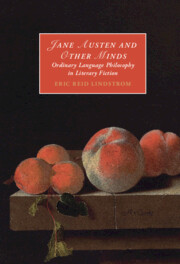Book contents
- Jane Austen and Other Minds
- Cambridge Studies in Romanticism
- Jane Austen and Other Minds
- Copyright page
- Contents
- Acknowledgments
- Abbreviations
- Introduction
- Chapter 1 Austen and Austin
- Chapter 2 Intelligible Community
- Chapter 3 Sense and Sensibility and Suffering
- Chapter 4 Pride and Prejudice and the Comedy of Perfectionism
- Chapter 5 Perlocutionary Entailments
- Chapter 6 Emma and Other Minds
- Chapter 7 Persuasion, Conviction, and Care Jane Austen’s Keeping
- Notes
- Bibliography
- Index
- Cambridge Studies in Romanticism
Chapter 2 - Intelligible Community
Published online by Cambridge University Press: 04 November 2022
- Jane Austen and Other Minds
- Cambridge Studies in Romanticism
- Jane Austen and Other Minds
- Copyright page
- Contents
- Acknowledgments
- Abbreviations
- Introduction
- Chapter 1 Austen and Austin
- Chapter 2 Intelligible Community
- Chapter 3 Sense and Sensibility and Suffering
- Chapter 4 Pride and Prejudice and the Comedy of Perfectionism
- Chapter 5 Perlocutionary Entailments
- Chapter 6 Emma and Other Minds
- Chapter 7 Persuasion, Conviction, and Care Jane Austen’s Keeping
- Notes
- Bibliography
- Index
- Cambridge Studies in Romanticism
Summary
Chapter 2 reads Austen’s first novel accepted for publication, Northanger Abbey, in terms of a zero-degree of intelligibility in communicative social exchange. Northanger Abbey presents Catherine Morland’s entry not just to Bath society but into the linguistic public. Throughout the novel, Catherine is subject to stratagems of deceit by her false friends, Isabella and John Thorpe. The latter even makes a coercive (and dishonorably deniable) marriage proposal that Catherine, in a state of absent-minded imaginative distraction, does not so much as uptake as information. J.L. Austin once identified untruth and unclarity as “the birthright” of all speakers. This mock birthright is the arrogation and entitlement of Thorpe. In a striking alignment of this kind of threat with its obverse – a critical investment of interest, if not fascination – Cavell explains his renewed reading of Austen only late in life as an exhausted intimacy with minor characters. In the tedious, packed rooms of Bath where nothing meaningful may happen, or originate, the main couple, Catherine and Henry, broach the possibility of intimacy through the precondition of the apartness of other minds.
Keywords
- Type
- Chapter
- Information
- Jane Austen and Other MindsOrdinary Language Philosophy in Literary Fiction, pp. 50 - 71Publisher: Cambridge University PressPrint publication year: 2022



